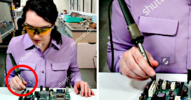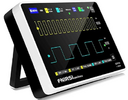Creativebrain116
- Feb 7, 2024
- 1
- Joined
- Feb 7, 2024
- Messages
- 1
Good evening yall,
I am newer to the electronics hobbyist group and I am starting to acquire the correct equipment I need. I already have a power supply, DMM, Rpi, arduino uno, breadboard and some misc components. However I am missing a quality soldering iron and a good o-scope that is under $200. Any ideas? Thanks in advance and God Bless!
I am newer to the electronics hobbyist group and I am starting to acquire the correct equipment I need. I already have a power supply, DMM, Rpi, arduino uno, breadboard and some misc components. However I am missing a quality soldering iron and a good o-scope that is under $200. Any ideas? Thanks in advance and God Bless!


